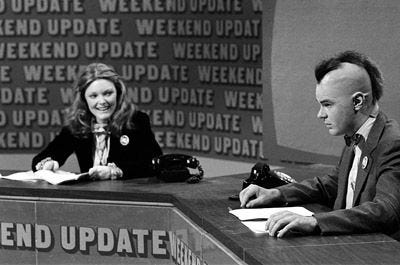Point-Counterpoint With the Salzillo Brothers (Part 2)
David's Version: Addressing the Conventional Takes of the Commentator Class
Hello everyone,
David here. Time for part 2.
First things first. My brother just turned 22 yesterday. Happy birthday, Mike!
While I am on the subject of my brother, let me say this: many within the Democratic Party have started talking about the DNC's need for a 50-State Strategy. As I have said on other forums, though, my brother was talking about this almost a year before the election. Consistently. For that, see this article on his blog about it. Or, this one. Or, this one.
The articles turned out to be sort of prophetic, especially his references to how "lack of engagement" has "fractured key party base groups, like...Hispanics & Latinos" (emphasis mine).
He was also sending emails of warning to prominent establishment Democrats in the days and weeks leading up to this election. Particularly about the possible disillusionment of the progressive base. I wish they had listened to him. Frankly, even I should have paid closer attention to what he was saying. Sure, I agreed with him, and if I were running a campaign I would not have run it the way Plouffe & Co. did. That said, I did not see (or perhaps I did not want to imagine) just how far that problem could eat into VP Harris's numbers.
Long story short? Watch my brother. He knows his stuff.
If you can take the other brother’s word for it.
In other news, CNN apparently has had a massive ratings dip. According to Pew Research and Nielsen data, Newsmax programming is starting to overtake CNN’s in the pivotal 7-8 PM primetime hour.
If CNN’s ratings keep going in this direction, Mr. “I Don’t Care Who’s President As Long As I Get My Mergers & Acquisitions” Zaslav is going to have a merger & acquisition the size of a peanut.
But I digress. There is a lot about this election that does not get enough attention. One part of that is what happened in Rural America, and why it happened the way it did. Here is another thing I learned from my brother that was indicative of the problem with the Harris campaign apparatus: The DNC this cycle did not have a rural help desk (see the above blog posts by Michael for more).
Given that Trump overperformed in rural areas most of all, this has proved to be a mistake. A big mistake. Combine this crucial over performance with Harris under performance, and you get a perfect storm and a Trump victory based on low turnout across the board and in almost every state.
For these reasons, both Michael and I think that Harris's personal instincts were right on picking Walz for just this reason. Both for short-term and long-term reasons. That is clearly the direction the party needed to go. However, the Harris campaign (it appears to me) put Walz in bubble wrap in its desire to "pivot towards the center" and "thread the needle" (the go-to buzzwords of the centrists in the Democratic Party).
But the beauty of Biden was that the center had changed. It had shifted towards attacking corporate power. Khan is a great example of that. Even Vance had a good deal of praise for Khan.
(Granted, in all likelihood, that Trump is going to get rid of her. She clearly unsettles his billionaire friends).
My point is that we shifted the center during Biden's term. We didn't have to flee from the most anti-establishment parts of our record; we needed to DOUBLE DOWN on them. Ideally, we would have started our campaign going full-on 1948, like anti-establishment President Harry Truman. Even if Biden started the campaign and then dropped out as he had this July, that anti-establishment message would have helped Harris by extension (more on that later).
Just some sketches of what was lacking this time around.
Biden gave us the policy blueprint. The progressive populists (Sherrod Brown, Bernie Sanders, Ruben Gallego) gave us the way forward, both on policy and on messaging. It is time to fuse the approaches once again to create a new America. That is how Trumpism will die, with a full replacement ready to go.
So, why did we lose? To be sure, there were global trends against incumbents. That was clear, and yet Biden was creating (or laying the foundation for) a strong substantive populist Democratic policy a la the old Democrats of FDR and Truman's day. That kind of policy is not comparable to the unpopular agenda of Macron, a man who raised the retirement age and drew the public’s ire for that and other related policies.
Nor was the Biden agenda comparable to the phony populism of incumbent Modi, who in many ways ran like Trump and suffered decisive defeats to his right-wing radical governing party.
So yes, the trend against incumbents was there. Though frankly, it wasn’t enough to explain why we lost. On top of that, there seem to be a few popular pseudo-explanations going around to explain the Democratic Party’s narrow defeat (nota bene, Donald; don’t overplay your hand).
Here’s just a few:
1) Because Biden had no reason to run again, he should have dropped out sooner. If he did drop out sooner, he would have guaranteed an easier and more winnable campaign for whoever took his place.
Think this out, and you may find that this pseudo-explanation does not exactly hold water.
Biden's party had a good performance in midterms despite peak inflation mere months before the actual elections. Given that type of party overperformance, and given Biden’s ties to the same type of union and working-class voters who made the difference in this election, and given the type of anti-establishment record he could have run on (if messaged right), and given how he thought his foreign policy experience would be a unique help in this time of unique foreign policy crises, Joe Biden had good reason to consider running again.
In fact, if we had the Biden of 4 years ago, and a Truman 1948-style campaign, I still hold that we could have easily won this race, even in spite of inflation.
Yet, for sake of argument, let's say Biden pulled out of the running right after the 2022 midterms. Then let's say Harris ran in a primary with Biden's endorsement and won. Okay. Do people forget that the type of statements that sunk her campaign were made in a contentious primary season (the transgender stuff, anyone)? How was a primary going to help with that, exactly? So the arguments on that front really do not make sense. Of course, we are dealing with hypotheticals. However, the conventional explanation of why we lost completely ignores that hypothetical.
Also recall that the theoretical primaries would have been occurring during the heights of the Gaza war. Unbeknownst to anyone in late 2022, of course. Since that war did almost incontestably cost the Harris-Walz ticket significant amounts of votes in this cycle (look at the south end of Dearborn now from 2020), it seems to follow that the primary season would have brought the Democratic Party's dispute on the matter out in the open much more intensely.
If history is any guide (1968 anyone?), it probably would have caused chaos on the convention floor and negative post-convention press to boot. Now, how much intra-party conflict would there have been in an open primary? We will never know for sure. Still, to those offering this explanation of the Party's loss, I ask a simple question: how would the Party have avoided the scenario that I just laid out here? Even if Harris won, or even if your generic establishment candidate won, the Gaza issue would still have hurt Democrats.
Again, it is hard to look back in retrospect. However, the fact that this does not even get considered in the mainstream post-election autopsies indicates both a failure of imagination and of the Democratic Party establishment to come to term with its failures.
It’s not about who Democrats ran. It’s about how they ran, and how they failed to lay out an ambitious progressive working and middle class agenda.
By the way, Gaza was not the only hot-button issue that divided Democrats. Though Gaza obviously had more potential to cause out-in-the-open conflict, that was not the only issue that openly divided Democrats. Those issues could have also come out in an intra-party brawl. That sort of tension almost always leads to the incumbent party losing votes in November. It is a fact of history. I repeat, look at 1968.
At the end of the day, if we ran a campaign that made us look like our agenda was simply maintaining the status quo (and I mean the 50-years-long status quo, created by Republicans going back to Reagan), we would have arguably lost regardless of who we ran. People are pissed off, and they wanted change. That much the polls have attested to. Current events provide a similar portrait of the American voter.
Here's another pseudo-explanation, closely related to the first:
2) We lost because Harris had to run a campaign in 100 days. Given the hill she was climbing in terms of incumbency especially, it was practically impossible for her to win.
That type of fatalism is unproductive and likely incorrect. While her campaign's start to finish was a sprint in American political time, in reality many places around the worldwide (including Europe) have their elections roughly in this amount of time. If this bold political experiment had succeeded, we would have talked about how it strengthened American democracy.
Many voters have tuned out our politics just because of how long "campaign season" here really is. If you coupled a shorter election season with more long-term party outreach via a Howard Dean-like 50-State Strategy, then perhaps that is the ideal arrangement for a strong revitalized American democracy and the Democratic Party.
Regardless, let’s get to the broader point of why this pseudo-explanation doesn't hold water. In a matter of weeks, we went from having our candidate say, "I have the experience, I have the character. Age is just a number, I'm going as hard at it as ever, let me do the job" to, "We need a new generation of leadership."
If we could try to create such a stark change in message on that front, why couldn’t we try to change the messaging in other ways, to tailor Harris's campaign to the electorate she was trying to win? And to tailor the way of getting out that message to the new digital age?
Three hours on with Joe Rogan would have certainly been a big help, incidentally.
Here's one last notable pseudo-explanation:
3) Harris should have picked Shapiro instead of Walz. That would have helped her in Pennsylvania and among "moderate voters."
Let's be clear: Walz was a good choice. He gave some hope to the types of progressives that stayed at home this election. I can tell you that anecdotally, and from the pushes by progressives to get him on the ticket. That alone is a one-up on Shapiro for Walz.
Governor Walz was a man from Rural America, who was attuned to the types of issues that affected Rural America. That also is a one-up on Shapiro. Trump overperformed heavily in Rural America, not Pennsylvania suburbia. That is why he won, and getting candidates like Walz to attract rural voters is exactly what we need to do.
Adding a good polished debater like Shapiro to the ticket was not going to fundamentally change the dynamics of the race (no offense to the still promising Pennsylvania Governor). If you still believe that against all evidence, you'll have to explain why VP Harris did not win this race by a landslide.
If even all this doesn't convince you, the New York Post presents us some evidence to the same effect. For fear of giving the New York Post too many clicks let me just quote the most objective part of the analysis: "The state office [election] margins — larger than the presidential gap – indicate problems deeper than any individual candidate’s shortcomings” (emphasis mine).
A polished debater would also not have helped Harris turn out her base, which decided this election. Nor would it have helped with voters preoccupied with Gaza, who may have sealed the deal for Trump in places like Michigan.
So, again, where was Shapiro going to help where Walz wasn't? In fact, if my criticism about "pivoting to the center" is accurate, then Shapiro would not have been the man best qualified to stop us from bleeding our base. Right? So why do we keep talking as if Harris needed to go “more moderate?”
Let me make one final point. President Biden has thus far been a convenient scapegoat for the failings of the status quo and the corporate class behind it. But let’s cut through the malarkey here: the anger that is palpable in this country (especially given recent events) has nothing to do with Joe Biden. It has everything to do with the Josh Gottheimers and the Joe Manchins and Kyrsten Sinemas that obstructed the best of his agenda. Biden wanted to be a historic president, and he was. But he could have done so much more to meet Americans where they were at—if not for the worries of the donor class and the power of “pay-to-play” politics post-Citizens United.
If you want someone to blame, don’t blame Biden. Blame Mark Cuban, his corporate ilk, and the Harris campaign team heads (who had multiple connections to the Clinton wing, Wall Street, Silicon Valley, and gig companies like Uber). They were the ones who pressed Harris to back off from criticizing corporate power. They were the ones who watered down Harris policies to vague stump speeches, punctuated with the occasional Megan Thee Stallion twerking sessions or Cardi B and J-Lo speeches. Mark Cuban and his CNBC donor class buddies were the ones who ensured that the campaign never truly got “on message.”
To borrow a phrase from William Jennings Bryan, Mark Cuban and his rich friends chose to crucify their country “upon a cross of gold” this election. They are the ones who need to be held accountable for this election loss. Not the people like President Joe Biden who tried to level the playing field.
If the Democratic establishment does not understand that, then they will lose again. And again. And again. And again. And all of America will pay the price for their folly.






